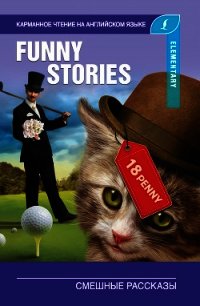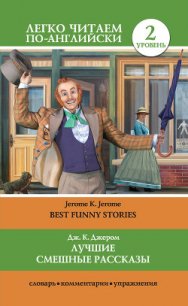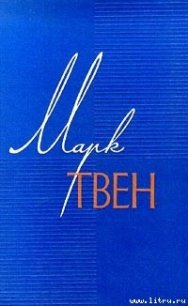Смешные рассказы / The Funny Stories - Твен Марк (читать книги без .TXT) 📗
Their ancient habit of going always together had its drawbacks when they grew up, and entered upon the luxury of courting. Both fell in love with the same girl. Each tried to steal clandestine interviews with her, but at the critical moment the other would always turn up. By and by Eng saw that Chang had won the girl’s affection; and, from that day, he had to live with the agony of being a witness to all their cooing. But with a supernatural generosity, he succumbed to his fate, and sat from seven every evening until two in the morning, listening to the fond foolishness and kisses of the two lovers. But he sat patiently, and waited, and yawned for two o’clock to come. And he took long walks with the lovers on moonlight evenings – sometimes walking ten miles, even though he was usually suffering from rheumatism. Eng cordially wanted them married, and done with it; but although Chang often asked the important question, the young lady could not gather sufficient courage to answer it while Eng was by. However, once, after having walked some sixteen miles, and sat up till nearly daylight, Eng dropped asleep from exhaustion, and then the question was asked and answered. The lovers were married. All acquainted with the circumstance applauded the noble brother-in-law. His faithfulness was the theme of every conversation. He had stayed by them all through their long courtship; and when at last they were married, he lifted his hands above their heads, and said, “Bless you, my children, I will never desert you!” and he kept his word. Fidelity like this is all too rare in this cold world.
By and by Eng fell in love with his sister-in-law’s sister, and married her, and since that day they have all lived together, night and day.
The sympathy existing between these two brothers is so close that the feelings and the emotions of the one are instantly experienced by the other. When one is sick, the other is sick; when one feels pain, the other feels it; when one is angry, the other’s temper takes fire.
At the same time, Chang belongs to the Good Templars, [6] and is a hard-working, enthusiastic supporter of all temperance reforms, but every now and then Eng gets drunk, and, of course, that makes Chang drunk too. This has been a great sorrow to Chang. Eng always walks alongside of him in temperance processions, drunk as a lord, yet no more hopelessly drunk than his brother, who has not tasted a drop. And so the two begin to yell, and throw mud and bricks at the Good Templars; and, of course, they break up the procession. It would be wrong to punish Chang for what Eng does, and, therefore, the Good Templars accept the situation, and suffer in silence and sorrow.
There is a moral in these solemn warnings. Let us profit by it.
I could say more of an instructive nature about these interesting beings, but let what I have written suffice.
Having forgotten to mention it sooner, I will remark in conclusion that the ages of the Siamese Twins are fifty-one and fifty-three years.
How I Edited an Agricultural Paper (Once)
I did not take temporary editorship of an agricultural paper without misgivings. But I was in circumstances that made the salary an object. The regular editor of the paper was going off for a holiday, and I accepted the terms he offered, and took his place.
The sensation of being at work again was luxurious, and I worked all the week with pleasure. We went to press, and I waited a day to see whether my effort was going to attract any notice. As I left the office in the evening, a group of men and boys at the foot of the stairs gave me passageway, and I heard one or two of them say: “That’s him!” I was naturally pleased by this incident. The next morning I found a similar group at the foot of the stairs, and couples and individuals standing here and there in the street, and over the way, watching me with interest. I heard one man say, “Look at his eye!” I pretended not to observe the attention I was attracting, but secretly I was pleased with it. I went up the stairs, and heard cheery voices and a laugh as I approached the door. I opened it and saw two young rural-looking men, whose faces went pale when they saw me, and then they both jumped through the window with a great crash. I was surprised.
In about half an hour an old gentleman entered, and sat down at my invitation. He seemed to have something on his mind. He took off his hat and set it on the floor, and got out of it a red silk handkerchief and a copy of our paper.
He put the paper on his lap and said, “Are you the new editor?”
I said I was.
“Have you ever edited an agricultural paper before?”
“No,” I said; “this is my first attempt.”
“I thought so. Have you had any experience in agriculture practically?”
“No. I believe I have not.”
“Some instinct told me so,” said the old gentleman, putting on his spectacles, and looking over them at me, while he folded his paper into a convenient shape. “I wish to read you what must have made me have that instinct. Listen, and see if it was you that wrote it: ‘Turnips should never be pulled, it injures them. It is much better to send a boy up and let him shake the tree.’ ”
“Now, what do you think of that? – for I really suppose you wrote it?”
“Think of it? Why, I think it is good. I have no doubt that every year millions and millions of turnips are spoiled in this township alone by being pulled in a half-ripe condition, when, if they had sent a boy to shake the tree… “
“Shake your grandmother! Turnips don’t grow on trees!”
“Oh, don’t they? Well, who said they did? The language was intended to be figurative. Anybody that knows anything will know that I meant that the boy should shake the vine.”
Then this old person got up and tore his paper all into small pieces, and stamped on them, and broke several things with his cane, and said I did not know as much as a cow; and then went out, and, in short, acted in such a way that I felt that he was displeased about something. But not knowing what the trouble was, I could not be any help to him.
Pretty soon after this a long creature, with thin locks hanging down to his shoulders, entered the office and halted, motionless, with finger on lip, and head and body bent in listening attitude. No sound was heard. Still he listened. No sound. Then he turned the key in the door, and tiptoed toward me. He was within long reaching distance of me, when he stopped. He scanned my face with interest for a while, drew a folded copy of our paper from his bosom, and said:
Конец ознакомительного фрагмента.
Текст предоставлен ООО «ЛитРес».
Прочитайте эту книгу целиком, купив полную легальную версию на ЛитРес.
Безопасно оплатить книгу можно банковской картой Visa, MasterCard, Maestro, со счета мобильного телефона, с платежного терминала, в салоне МТС или Связной, через PayPal, WebMoney, Яндекс.Деньги, QIWI Кошелек, бонусными картами или другим удобным Вам способом.
There is a moral in these solemn warnings. Let us profit by it.
I could say more of an instructive nature about these interesting beings, but let what I have written suffice.
Having forgotten to mention it sooner, I will remark in conclusion that the ages of the Siamese Twins are fifty-one and fifty-three years.
How I Edited an Agricultural Paper (Once)
I did not take temporary editorship of an agricultural paper without misgivings. But I was in circumstances that made the salary an object. The regular editor of the paper was going off for a holiday, and I accepted the terms he offered, and took his place.
The sensation of being at work again was luxurious, and I worked all the week with pleasure. We went to press, and I waited a day to see whether my effort was going to attract any notice. As I left the office in the evening, a group of men and boys at the foot of the stairs gave me passageway, and I heard one or two of them say: “That’s him!” I was naturally pleased by this incident. The next morning I found a similar group at the foot of the stairs, and couples and individuals standing here and there in the street, and over the way, watching me with interest. I heard one man say, “Look at his eye!” I pretended not to observe the attention I was attracting, but secretly I was pleased with it. I went up the stairs, and heard cheery voices and a laugh as I approached the door. I opened it and saw two young rural-looking men, whose faces went pale when they saw me, and then they both jumped through the window with a great crash. I was surprised.
In about half an hour an old gentleman entered, and sat down at my invitation. He seemed to have something on his mind. He took off his hat and set it on the floor, and got out of it a red silk handkerchief and a copy of our paper.
He put the paper on his lap and said, “Are you the new editor?”
I said I was.
“Have you ever edited an agricultural paper before?”
“No,” I said; “this is my first attempt.”
“I thought so. Have you had any experience in agriculture practically?”
“No. I believe I have not.”
“Some instinct told me so,” said the old gentleman, putting on his spectacles, and looking over them at me, while he folded his paper into a convenient shape. “I wish to read you what must have made me have that instinct. Listen, and see if it was you that wrote it: ‘Turnips should never be pulled, it injures them. It is much better to send a boy up and let him shake the tree.’ ”
“Now, what do you think of that? – for I really suppose you wrote it?”
“Think of it? Why, I think it is good. I have no doubt that every year millions and millions of turnips are spoiled in this township alone by being pulled in a half-ripe condition, when, if they had sent a boy to shake the tree… “
“Shake your grandmother! Turnips don’t grow on trees!”
“Oh, don’t they? Well, who said they did? The language was intended to be figurative. Anybody that knows anything will know that I meant that the boy should shake the vine.”
Then this old person got up and tore his paper all into small pieces, and stamped on them, and broke several things with his cane, and said I did not know as much as a cow; and then went out, and, in short, acted in such a way that I felt that he was displeased about something. But not knowing what the trouble was, I could not be any help to him.
Pretty soon after this a long creature, with thin locks hanging down to his shoulders, entered the office and halted, motionless, with finger on lip, and head and body bent in listening attitude. No sound was heard. Still he listened. No sound. Then he turned the key in the door, and tiptoed toward me. He was within long reaching distance of me, when he stopped. He scanned my face with interest for a while, drew a folded copy of our paper from his bosom, and said:
Конец ознакомительного фрагмента.
Текст предоставлен ООО «ЛитРес».
Прочитайте эту книгу целиком, Купить полную версию книги




